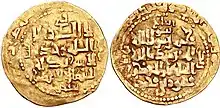Mahmud II (Seljuk sultan)
Mahmud II (c. 1105 – 1131) was the Seljuk sultan of Baghdad from 1118–1131 following the death of his father Muhammad I Tapar.[1] At the time Mahmud was fourteen, and ruled over Iraq and Persia.
| Mahmud II | |
|---|---|
 Gold dinar struck under Mahmud II, citing governor Inanch Yabghu. Struck at the Rudhravar mint, dated 1125/6 | |
| Sultan of the Great Seljuk Empire | |
| Reign | 1118 – 1131 |
| Predecessor | Muhammad I |
| Successor | Civil war |
| Born | c. 1105 |
| Died | 1131 (age 26) |
| Consort | Mah-i Mulk Khatun Amir Siti Khatun Ata Khatun |
| Father | Muhammad I |
| Mother | Gawhar Khatun |
Biography
During Mahmud's early reign, his vassal king Garshasp II, who was a favorite of his father Muhammad I, fell into disgrace. Slander about him spread to the court that made him lose confidence, and made Mahmud send a military force to Yazd where Garshasp was arrested and jailed in Jibal, while Yazd was granted to the royal cupbearer. Garshasp, however, escaped and returned to Yazd, where he requested protection from Mahmud's rival Ahmad Sanjar (Garshasp's wife was the sister of Ahmad). Garshasp urged Ahmad to invade the domains of Mahmud in Central Persia, and gave him information on how to march to Central Persia, and the ways to combat Mahmud. Ahmad accepted and advanced with an army to the west in 1119, where he together with five kings defeated Mahmud at Saveh.[1] The kings who aided Ahmad during the battle were Garshasp II himself, the emirs of Sistan and of Khwarazm,[1] and two other unnamed kings. After being victorious, Ahmad then restored the domains of Garshasp II.[2]
Ahmad then proceeded as far as Baghdad, whereupon Mahmud was married to one of Sanjar's daughters, made his uncle's heir, and forced to give up strategic territories in northern Persia.[1]
Mahmud's younger brother Mas'ud revolted against him in 1120, but the civil war ended the following year due to the intervention of the atabeg of Mosul, Aqsunqur al-Bursuqi, and Mas'ud was pardoned. In 1126, al-Bursuqi was murdered by Assassins, believed have been under orders from Mahmud. In 1127, he appointed Anushirvan ibn Khalid as his vizier, but had him removed from the office the following year. In 1129 Mahmud officially recognized the authority of Zengi, who had supported him against a revolt led by al-Mustarshid, caliph of Baghdad, in Syria and northern Iraq.
Mahmud, then aged 26, died in 1131. His death was followed by a civil war between his son Dawud, and his brothers Mas'ud, Suleiman-Shah, and Toghrul II. His other son Alp Arslan ibn Mahmud was ruler of Mosul with atabeg Zengi.
References
- Bosworth 1968, p. 120.
- Bosworth 1983, pp. 328-329.
Sources
- Bosworth, C. E. (1968). "The Political and Dynastic History of the Iranian World (A.D. 1000–1217)". In Frye, R. N. (ed.). The Cambridge History of Iran, Volume 5: The Saljuq and Mongol periods. Cambridge: Cambridge University Press. pp. 1–202. ISBN 0-521-06936-X.CS1 maint: ref=harv (link)
- Bosworth, C. Edmund (1983). "ABŪ KĀLĪJĀR GARŠĀSP (II)". Encyclopaedia Iranica, Vol. I, Fasc. 3. London et al.: C. Edmund Bosworth. pp. 328–329.CS1 maint: ref=harv (link)
| Preceded by Muhammad I Tapar |
Sultan of the Seljuk Empire 1118–1131 |
Succeeded by Civil war |